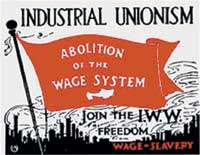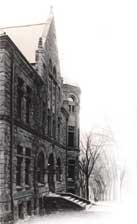 To celebrate its 75th anniversary, throughout 2003 the
Wisconsin Lawyer will include "From the Archives," a monthly
column devoted to lively snippets from past issues. Material is quoted
directly and attributed when the contributor is known. More in-depth
coverage of the magazine's publishing history will appear in September,
as part of the State Bar's 125th anniversary celebration this year.
To celebrate its 75th anniversary, throughout 2003 the
Wisconsin Lawyer will include "From the Archives," a monthly
column devoted to lively snippets from past issues. Material is quoted
directly and attributed when the contributor is known. More in-depth
coverage of the magazine's publishing history will appear in September,
as part of the State Bar's 125th anniversary celebration this year.
Number of pickets limited in labor strikes
Feb. 1935, at 57: At the Annual Meeting of the Board of Circuit
Judges, held Jan. 3-4 in Madison, the attendees discussed "rulings by
Judge John J. Gregory of Milwaukee, in recent picketing and strike
cases, limiting the number of pickets. Judge Gustav G. Gehrz stated that
the point was taken care of by the rule of what is reasonable, and that
at times it may be necessary to go deeply into labor cases to discover
underlying causes; that the court can do good work in this field; that
wages below the minimum living standard are often the source of the
trouble."
What is an "inebriate"?
Feb. 1935, at 59: At the Annual Meeting of the County Judges'
Association of Wisconsin, held Dec. 27 in Milwaukee, Judge R.R. Luce of
Walworth County recommended "amendments to the statutes to define
inebriates and to provide for the proper care of them and of drug
addicts. He said that our present machinery has lost sight of the fact
that drunkards, drug addicts, and the insane are sick persons, and
treats them like criminals."
Rough economic times open door to anarchy
 Aug. 1935, at 162: During his address at the Bar's annual
convention in June, outgoing president T.L. Doyle of Fond du Lac
"described an incident in his own city, where ... farmers were gathered
together in command of a leader who bitterly assailed our government and
then introduced a young man speaker who also attacked the government,
stating that he would not support it nor fight for it. [Doyle] said
similar occurrences were not uncommon in Wisconsin during the past two
years and many of the strikes in industry, transportation, and
agriculture were inspired by outside radicals. That reports of
investigators show that millions of dollars are expended in our country
advertising Communism, with the purpose to destroy our form of
government and put in its place a dictatorship similar to that of the
tyrannical misrule in Russia; that while red representatives have been
inciting masses to violence and revolution, they have also endeavored to
render our national, state, and municipal governments weak and
powerless. ... He concluded that it is essential that the masses of our
people be made to understand our form of government and the great
principles upon which it is based and that the bar owes it to the nation
and to the state to use its best efforts and influence to preserve the
basic principles of the Constitution, which principles have been and
will continue to be on trial."
Aug. 1935, at 162: During his address at the Bar's annual
convention in June, outgoing president T.L. Doyle of Fond du Lac
"described an incident in his own city, where ... farmers were gathered
together in command of a leader who bitterly assailed our government and
then introduced a young man speaker who also attacked the government,
stating that he would not support it nor fight for it. [Doyle] said
similar occurrences were not uncommon in Wisconsin during the past two
years and many of the strikes in industry, transportation, and
agriculture were inspired by outside radicals. That reports of
investigators show that millions of dollars are expended in our country
advertising Communism, with the purpose to destroy our form of
government and put in its place a dictatorship similar to that of the
tyrannical misrule in Russia; that while red representatives have been
inciting masses to violence and revolution, they have also endeavored to
render our national, state, and municipal governments weak and
powerless. ... He concluded that it is essential that the masses of our
people be made to understand our form of government and the great
principles upon which it is based and that the bar owes it to the nation
and to the state to use its best efforts and influence to preserve the
basic principles of the Constitution, which principles have been and
will continue to be on trial."
Kohler Co. benefits workers; strikers cause $6,000 in
damage
May 1935, at 117: "Lyman C. Conger, attorney for the Kohler Company
of Kohler, recently talked before the Kiwanis club of Columbus. He
described Kohler village with its beautiful planned streets and homes,
and told of the Kohler Building and Loan Co., the purpose of which was
to enable employees to build and own their own homes. He also stated
that it had been the purpose of the Kohler Co. to make Kohler a village
in which people would like to work and live; also, that the company had
kept men at work all through the Depression, which began in the building
trades in 1928, and did not cut hours until matters became acute in
1932.
He described the pensioning plan begun by Kohler long ago, and said
the company made it a rule not to discharge employees because of
advanced age. He stated that 2,000 people are employed at the Kohler
plant and that prospects for business are better than they have been;
that the damage done to the plant by strikers amounted to about $6,000;
that in his opinion, the Kohler Company employees' union was not a
company union and that few of the striking employees lived in Kohler
village, most of them being those who came in to work from Sheboygan and
Sheboygan Falls.
Introducing board of pardons
Feb. 1935, at 46: "John B. Chase, Oconto attorney, and Judge Robert
S. Cowie, La Crosse, have been named by Gov. La Follette as members of a
state board of pardons which will decide questions of executive clemency
on a scientific basis, in conformity with recommendations of the
American Bar Association and sociologists."
U.W. Law School opens placement bureau
 May
1935, at 96: "The U.W. Law School has established a placement bureau,
the purpose of which is to bring together those offering employment and
those seeking employment in legal and related fields. John Stedman, ...,
is in charge of the work. A few law graduates each year have definite
plans for the future. Most of them, however, step out of law school with
no place to go and with very little idea of how and where to find a
place. There often ensues a shopping tour which, especially in the
larger centers, resembles, and is about as productive of results as, a
house-to-house canvass. Attorneys, besieged by applicants, become
irritated. Applicants become discouraged. The final consequences of this
hit-or-miss method is that men too often settle in localities where they
are out of place, engage in kinds of work for which they are not
adapted, or hang out their shingles at random in places that are already
more than adequately supplied with lawyers. If this bureau can help to
correct this situation it will have performed a real service to the
students and to the bar as well."
May
1935, at 96: "The U.W. Law School has established a placement bureau,
the purpose of which is to bring together those offering employment and
those seeking employment in legal and related fields. John Stedman, ...,
is in charge of the work. A few law graduates each year have definite
plans for the future. Most of them, however, step out of law school with
no place to go and with very little idea of how and where to find a
place. There often ensues a shopping tour which, especially in the
larger centers, resembles, and is about as productive of results as, a
house-to-house canvass. Attorneys, besieged by applicants, become
irritated. Applicants become discouraged. The final consequences of this
hit-or-miss method is that men too often settle in localities where they
are out of place, engage in kinds of work for which they are not
adapted, or hang out their shingles at random in places that are already
more than adequately supplied with lawyers. If this bureau can help to
correct this situation it will have performed a real service to the
students and to the bar as well."
Immigration laws boon to smugglers
May 1935, at 123: "Walter P. Melchior of New London recently spoke on
'Our Immigration Laws,' which he said are confusing and in many cases
contradictory and that under them the smuggling of aliens into this
country has become a gigantic business, operated largely by
representatives of steamship companies and involving families of some of
the nation's financial leaders."
Investigation of official abuse at reformatory
Feb. 1935, at 54: "Circuit Judge William R. Foley of Superior (11th
judicial circuit) has been appointed by Gov. La Follette to conduct an
investigation of the Board of Control and all penal and charitable
institutions under its jurisdiction. The investigation came as a result
of shocking charges of official abuse and misconduct at the Green Bay
reformatory, and the Governor handed Judge Foley almost unlimited
investigational powers and asked him to move speedily in an impartial
probe."
Wood County DA drives out prostitution
May 1935, at 120: "The Wood County Board of Supervisors recently
passed a resolution recommending that no tavern licenses be granted to
persons known as prostitutes or keepers of houses of ill fame. The
resolution was an official endorsement of DA Hugh W. Goggins' recent
drive against prostitution in Wood County."
